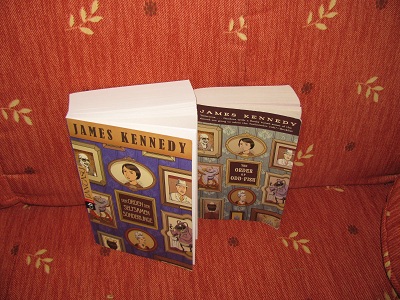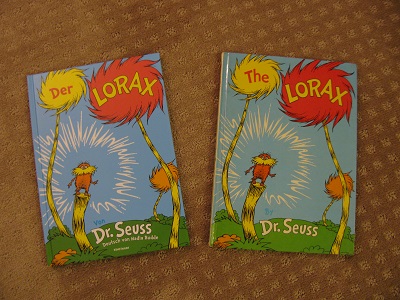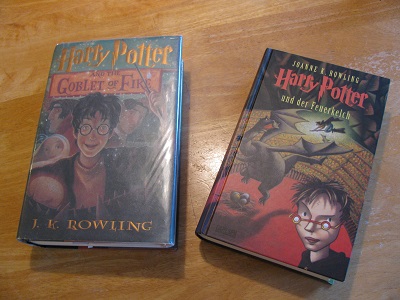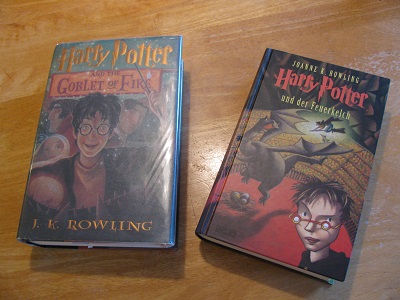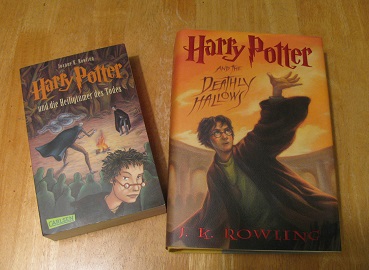It’s time for Sonderling Sunday! That time of the week when I play with language by looking at the German translation of Children’s Books.
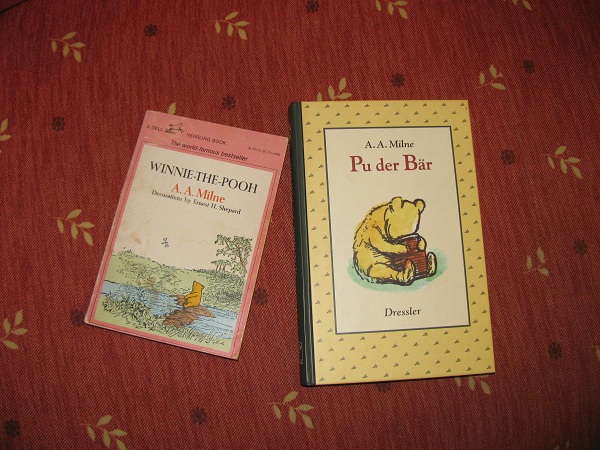
Tonight, on a whim, I think I’ll go back to Pu der Bär, otherwise known as Winnie-the-Pooh, by A. A. Milne.
It’s been more than a month since I posted Sonderling Sunday, but today I finished a fabulous book for the Cybils, so I can take an hour and indulge in Sonderling Sunday. Once again, I think I’ll dedicate this week’s post to my niece Kristen, who will be studying in Germany next year. Let’s see if I can find some handy-dandy German phrases for her to learn from Winnie-the-Pooh!
Today we’ll be looking at the second chapter, “In Which Pooh Goes Visiting and Gets Into a Tight Place” = In welchem Pu einen Besuch macht und an eine enge Stelle gerät
Now for some handy phrases:
“Pooh for short” = einfach Pu (“simply Pooh”)
I’d like Kristen to need this phrase, whether she actually does or not:
“… was walking through the forest one day, humming proudly to himself.”
= … ging eines Tages durch den Wald und summte stolz vor sich hin.
“a little hum” = ein kleines Gesumm
“Stoutness Exercises” = Kraftübungen (“Strength exercises” — not the same thing at all!)
“as he stretched up as high as he could go” = und er reckte sich, so hoch er konnte
“as he tried to reach his toes” = als er versuchte seine Zehen zu erreichen
“by heart” = auswendig
(This is interesting. It seems to be “out” + “nimble, mobile.” So it gives the idea of readily available. No heart mentioned at all.)
“right through” = vollständig
“properly” = fehlerfrei (“failure-free”)
“sandy bank” = sandigen Abhang
This one’s a bit longer in German (Surprise, surprise!):
“If I know anything about anything” = Wenn ich überhaupt irgendwas über irgendwas weiß
“Rabbit means Company” = Kaninchen bedeutet Gesellschaft
“Company means Food and Listening-to-Me-Humming and such like”
= Gesellschaft bedeutet Essen und Mirbeim-Summen-Zuhören und Ähnliches in der Art
“scuffling noise” = ein Trippeln (“a scurrying”)
“Bother!” = So ein Mist!
This has to be included for the nice long word:
“Well, could you very kindly tell me where Rabbit is?”
= Könnten Sie mir dann liebenswürdigerweise sagen, wo Kaninchen ist?
“very much surprised” = überaus erstaunt
“So Pooh pushed and pushed and pushed his way through the hole”
= Also gab sich Pu einen Schubs und noch einen Schubs und noch einen Schubs in das Loch hinein
(“So Pooh gave himself a shove and another shove and another shove through the hole.”)
“You were quite right” = Du hattest völlig Recht
“looking at him all over” = sah ihn von oben bis unten an
Words to live by:
“One can’t have anybody coming into one’s house.”
= Man kann nicht jeden in sein Haus lassen.
“a mouthful of something” = einem Mundvoll irgendwas
‘a little something” = eine Kleinigkeit
“Honey or condensed milk with your bread?” = Honig oder Kondensmilch zum Brot?
“not to seem greedy” = um nicht gierig zu wirken
“humming to himself in a rather sticky voice” = mit ziemlich klebriger Stimme vor sich hin summend
“So he started to climb out of the hole.” = Und er begann aus dem Loch zu klettern.
“front paws” = Vorderpfoten
“back paws” = Hinterpfoten
“I can’t do either!” = Es gelingt er beides nicht!
“front door” = Vordertür
“Hallo, are you stuck?” = Hallo, sitzt du fest?
“carelessly” = sorglos
“one of us was eating too much” = einer von uns beiden zu viel isst
“Silly old Bear” = Dummer alte Bär
“sniffing slightly” = schniefte leicht
“Rabbit scratched his whiskers thoughtfully” = Kaninchen kratzte sich nachdenklich am Schnurrbart
“having got so far, it seems a pity to waste it.”
= nachdem du nun schon mal so weit vorgedrungen bist, Verschwendung wäre, nicht in derselben Richtung weiterzuarbeiten.
(“after you have already penetrated so far, it would be a waste not to work further in the same direction.”)
Good words to know:
“‘We’ll read to you,’ said Rabbit cheerfully.”
= »Wir werden dir vorlesen«, sagte Kaninchen vergnügt.
It’s hard to imagine needing to use this phrase, but best to be prepared:
“do you mind if I use your back legs as a towel-horse?”
= Würde es dir etwas ausmachen, wenn ich deine Hinterbeine als Handtuchhalter verwende?
“doing nothing” = untätig
“it would be very convenient just to hang the towels on them.”
= es wäre sehr praktisch, wenn ich meine Handtücher dort zum Trocknen aufhängen könnte.
(“It would be very convenient, if I my hand towels there to dry could hang.” — Now it’s wet towels!)
“gloomily” = düster
And practical to know:
“What about meals?”
= Wie ist es mit den Mahlzeiten?
“getting thin quickly” = schnelleren Dünnerwerdens
“Bear began to sigh” = Bär wollte gerade seufzen
“tightly stuck” = eingeklemmt
And my favorite sentence from this chapter:
“Then would you read a Sustaining Book, such as would help and comfort a Wedged Bear in Great Tightness?”
= Würdest du dann bitte ein gehaltvolles Buch vorlesen, eins, das einem eingeklemmten Bären in starker Bedrängnis Hilfe und Trost spendet?
“slenderer” = schlanker
“all Rabbit’s friends and relations” = sämtliche Bekannten-und-Verwandten von Kaninchen
And not to give anything away, but here’s the last paragraph of the Zweite Kapitel:
“So, with a nod of thanks to his friends, he went on with his walk through the forest, humming proudly to himself. But, Christopher Robin looked after him lovingly, and said to himself, ‘Silly old Bear!'”
= Also schenkte er seinen Freunden ein Nicken des Dankes und setzte seinen Weg fort, wobei er stolz vor sich hin summte.
Aber Christopher Robin sah ihm liebevoll nach und sagte »Dummer alter Bär!« vor sich hin.
That’s quite enough for this week! Here’s wishing that you may read ein gehaltvolles Buch this week!
